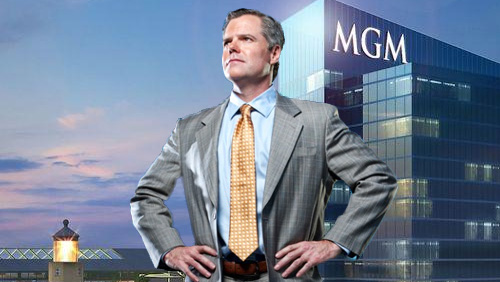James Murren, chief executive of MGM Resorts International, is going the extra mile to end the Connecticut gaming monopoly enjoyed by the Mashantucket Pequot and Mohegan tribal nations.
 The Connecticut Mirror reported that Murren flew to Connecticut on Tuesday to convince state lawmakers to pass a bill that would turn MGM’s $675 million casino and entertainment complex plan in Bridgeport into a reality.
The Connecticut Mirror reported that Murren flew to Connecticut on Tuesday to convince state lawmakers to pass a bill that would turn MGM’s $675 million casino and entertainment complex plan in Bridgeport into a reality.
Murren also urged legislators to revisit the decades-old agreements it entered into with the two tribes “for the benefit of the entire state.” Under the agreement, Foxwoods Resort Casino and Mohegan Sun have the exclusive right to operate slot machines in the state.
“I’m looking for widespread economic development in Bridgeport, not a box of slots, not a casino, but a resort development that will stimulate tourism to your state, activate multiple industries and weave together the already beautiful tapestry of arts, entertainment, retail, culture that already exists,” Murren told businessmen in an event, according to the news agency.
MGM is Connecticut’s best bet when it comes to competing with its neighboring states, according to Murren.
Casinos will soon open in Massachusetts, Rhode Island plans to expand its gambling market, and New York is set to offer table games.
“The question for Connecticut becomes ‘what do we do with this information that we have?’” Murren said. “What does Connecticut do about that? They can wish it away and hope it doesn’t happen, which is not logical. Or it could address this.”
MGM’s bad blood with Foxwoods and Mohegan started after the two tribes successfully convinced legislators to allow them to jointly develop a casino in East Windsor. The joint venture aims to compete with MGM’s new development located just over the border in Springfield, Massachusetts.
To protect their $950 million MGM Springfield resort complex, MGM has asked the 2nd U.S. Circuit Court of Appeals in Manhattan to block the construction of the East Windsor casino.
MGM argued that Connecticut violated its own state constitution when it allowed the construction of a satellite casino on non-tribal land. The Manhattan court, however, rejected MGM’s request.
After suffering a legal defeat, MGM announced its plan to construct a casino in Bridgeport to help Connecticut win over players from New York City.





